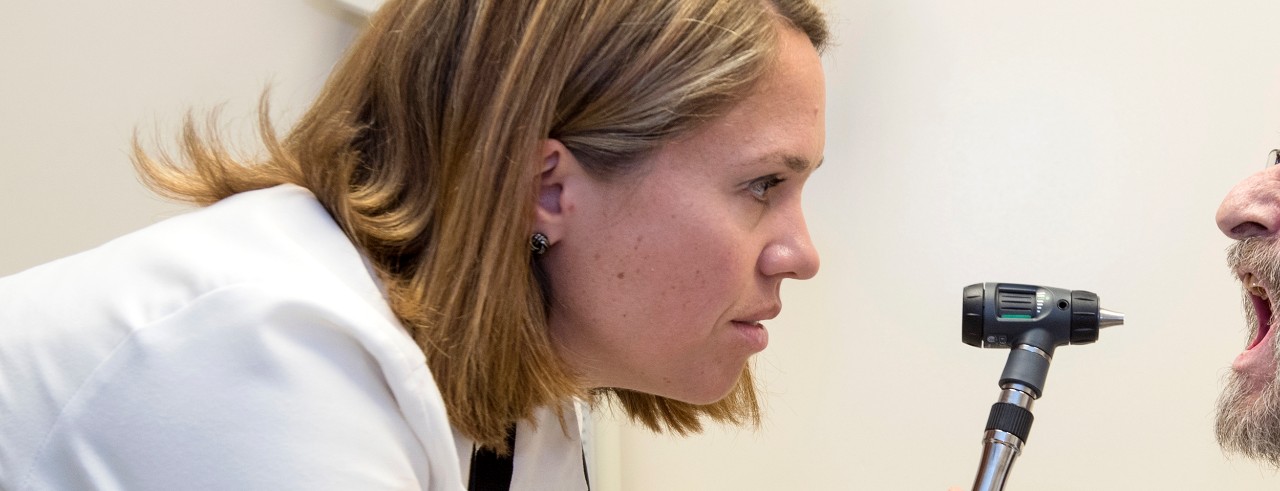
UC research: Immunotherapy safe for patients with COVID-19, cancer
Initial findings show that immunotherapy for cancer won’t worsen complications for COVID-19 patients
Preliminary data from researchers at the University of Cincinnati Cancer Center show that immunotherapy doesn’t necessarily worsen complications for patients with both COVID-19 and cancer.
This data is being presented by Layne Weatherford, PhD, UC postdoctoral fellow, at the American Association for Cancer Research Virtual Meeting: COVID-19 and Cancer, Monday, July 20.
Weatherford works in the lab of Trisha Wise-Draper, PhD, an associate professor of medicine, Division of Hematology Oncology, at the UC College of Medicine, UC Health oncologist and medical director of the UC Cancer Center Clinical Trials Office.
“Many COVID-19 complications result from an overactive immune response, leading to an increased production of proteins called cytokines,” Weatherford says. “Increased production of these proteins can cause issues like respiratory failure. Patients with cancer are more susceptible to COVID-19 infection as well as severe complications from it.
“Many patients with cancer are treated with immunotherapy, which activates the immune system against cancer to destroy it. In patients with both COVID-19 and cancer, our team thought that immunotherapy might increase the immune system response, which could already be overactive because of the COVID-19 infection.”
Wise-Draper says researchers thought treating COVID-19 patients with cancer immunotherapy might result in worsening patients’ health and overall outcomes.
“We are continuing to investigate whether immunotherapy causes an increased production of these proteins by immune cells from COVID-19 patients, but our initial findings are showing that immunotherapy is not significantly impacting it,” she adds.
Researchers are conducting this study using blood samples from patients with cancer taken from the UC COVID-19 biorepository, which Kris Hudock, MD, assistant professor in the Division of Pulmonary, Critical Care and Sleep Medicine at the UC College of Medicine, oversees.
“We are examining how immune checkpoint inhibitors, drugs that allow immune cells to respond more strongly, in combination with other treatments, like chemotherapy or radiation, affect the immune cells of COVID-19 patients and patients with both COVID-19 and cancer,” she says.
She and Weatherford add that their preliminary data show that an anti-diabetic drug, metformin, can reduce production of these proteins by immune cells of COVID-19 patients.
“These are promising, initial findings,” Wise-Draper says. “Additional research is needed, but our results show that we might be able to treat COVID-19 complications with metformin or a similar drug one day.”
Read more about COVID-19 and cancer-related research at UC.
Featured photo of Trisha Wise-Draper, MD, PhD, by Colleen Kelley/UC Creative + Brand.
Impact Lives Here
The University of Cincinnati is leading public urban universities into a new era of innovation and impact. Our faculty, staff and students are saving lives, changing outcomes and bending the future in our city's direction. Next Lives Here.
Stay up on all UC's COVID-19 stories, read more #UCtheGood content, or take a UC virtual visit and begin picturing yourself at an institution that inspires incredible stories.
Related Stories
UC, GE Aerospace Foundation celebrate Next Engineers grads
April 15, 2025
The University of Cincinnati played host in April to the graduation of this year’s class of the GE Aerospace Foundation’s Next Engineers, a global college- and career-readiness program that provides scholarship incentives for young people to become engineers.
Paralyzed Veterans of America grant funds UC research with end...
April 15, 2025
University of Cincinnati researchers, in collaboration with end users in the community, have received a $200,000 grant from Paralyzed Veterans of America to design a user-centered, easy-to-use assistive device to help restore hand grasping motions for people with spinal cord injuries/diseases.
UC program tackles health care worker shortage
April 15, 2025
The Healthcare Exploration Through Patient Care course allows University of Cincinnati students to train and work as patient care assistants (PCAs) within the UC Health system, offering them paid, hands-on experience in hospital settings while earning academic credit.
